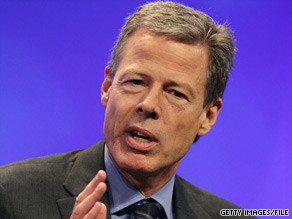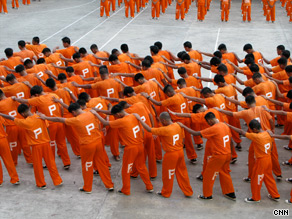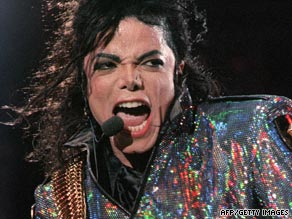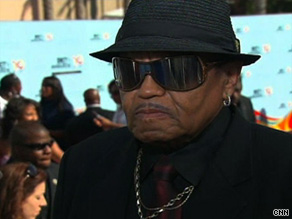CNN -- Jesse Levey is a Republican activist who says he believes in family values, small government and his lesbian mothers' right to marry.

Jeff DeGroot on hiking trip with his mothers, Elisabeth, on his left, and Meg Grear, on his right.
Levey is part of the "gayby boom" generation. The 29-year-old management consultant is the son of a lesbian couple who chose to have a child through artificial insemination. He's their only child.
Critics of same-sex marriage say people such as Levey will grow up shunned and sexually confused. Yet he says he's a "well-adjusted heterosexual" whose upbringing proves that love, not gender, makes a family.
"You can imagine what my parents thought when I was 13 and listening to Rush Limbaugh everyday," Levey says. "But my family had strong family values. I was raised in a loving, caring household that let me be a free thinker."  Watch how bar riots sparked gay movement »
Watch how bar riots sparked gay movement »
The modern gay rights movement began 40 years ago this weekend during the Stonewall Riots in New York City. While much of the controversy surrounding gay rights today has centered on same-sex marriage, a battle is brewing over another family issue: Is it bad for children to be raised by gay or lesbian parents.  Explore the modern gay rights movement »
Explore the modern gay rights movement »
It damages the children, says Dale O'Leary, author of "One Man, One Woman: A Catholics Guide to Defending Marriage." She says that all children have a natural desire for a parent of each gender.
But children of same-sex couples are forced to repress that desire because their parents won't accept it, she says. Their parents won't acknowledge their children's needs because they don't want to admit that they have caused their children to suffer.
"A baby is not a trophy -- the child's welfare has to be considered," she says. "These children are more likely to experiment with same-sex relationships. They're more likely to be confused and hurt."
Children of same-sex couples come out of the closet
O'Leary says she doesn't personally know any same-sex parents or their children. That's the problem, some children of same-sex children say. So many people are talking about them; not enough are talking to them, they say.
Some gayby boomers say they are tired of hearing that their family isn't legitimate. It's an argument many have heard since they were children. They learned that they didn't fit the definition of the "right" family, and worried how others would react if they found out about their parents.
The result: the children of same-sex couples often lived lives that were more closeted than their parents.
"Many of us were so closeted that we didn't know others like us were out there," says Danielle Silber, a 26-year-old fundraiser for the International Rescue Committee, who was raised by lesbian mothers and gay fathers in Takoma Park, Maryland.
"In middle school, because of pervasive homophobia and taunting, I didn't tell any of my new friends in school about my family to the point where I wouldn't invite them to my birthday parties," Silber says.
Silber says she didn't tell her parents about her fear of harassment because she was afraid to stand up for her family in school even though she was proud of them.
"Although I would normally turn to my family, I couldn't because I was ashamed that I was ashamed of them," she says.
Shame has now turned to pride for some gayby boomers. Many are now adults. They're writing memoirs, searching one another out online and have even formed their own support and advocacy group.
Their numbers are increasing as well, according to COLAGE (Children of Lesbians and Gays Everywhere). At least 10 million people have one or more lesbian, gay, bisexual or transgender parent.
"As Harvey Milk [the first openly gay man elected to a major public office] said, the more people know us, the less they'll vote against us," says Silber, coordinator of COLAGE's New York chapter. "The more our voices are heard, the less other people will be bigoted."
Who do you call mom?
The more the children of same-sex couples come out, though, the more questions outsiders have about their unusual upbringing. Some common ones: Who do you call mom when you have two mothers? Did you ever miss not having a mom or dad?
And the most tedious for most gayby boomers: What's your sexual orientation?
The answers to these questions are as varied as the lives of gayby boomers themselves.
Take the question about missing a mom and dad. Jeff DeGroot, 23, was raised by two lesbian mothers in Oregon. He doesn't buy the argument that there's a void in his life because he never had a dad toss a baseball to him.
"My parents can throw a baseball and take me hiking just as well as any man could," DeGroot says. "I've always had a plethora of male role models. I never felt that I was missing anything by not having that dad for me."
DeGroot does periodically share one struggle with other same-sex children -- what do call his parents.
Since he's raised by two lesbians, who does he call mom? Other same-sex children address the same linguistic challenge by either calling their parents by their first names, or by using expressions like, "my other dad," or "kind-of-my mom," same-sex children researchers say.
"If I'm on one side of the house and I want to talk to my biological mom, I'll yell, 'Mother,' '' DeGroot says, chuckling. "If Meg [one of his mothers] says, 'Yes?' I'll say, 'No, other mother.' "
Dealing with teasing from classmates and the community isn't so easy, same-sex children say. It's not unusual to hear children of same-sex couples say that they were teased by classmates, but some of that may depend on their age and where they grew up.
DeGroot, for example grew up in Corvallis, Oregon. The city is in a college town and in a liberal state. DeGroot's age may help, too. He didn't grow up in the 1970s, but came of age recently when gay couples were generally more accepted.
DeGroot's biological mother, Elisabeth, says her community didn't criticize her or her partner for raising their son. Some of her son's friends actually thought their son was cool for having two lesbian moms, she says.
"It was so in being gay and lesbian," she says. "Some of Jeff's classmates would say, 'Oh, you got two moms? I got to meet them!' ''
Elisabeth's partner, Meg Grear, says she gets upset when she hears critics say that children of same-sex will grow up physiologically damaged.
"That makes me mad. I know better. There's Jeff," she says.
Do gay parents produce gay kids?
Some children of same-sex couples say their upbringing actually makes them psychologically stronger.
Abigail Garner, author of "Families Like Mine: Children of Gay Parents Tell It Like It is," calls her upbringing a "fabulous gift." She is the daughter of two gay dads and a straight mom.
She says her interviews with other children of gay or lesbian parents showed that those who shared her upbringing tend to be more empathetic and unafraid to take unpopular stands.
"I'm not surprised when I hear gay parents say their child stood up for the kid who was bullied in class or reached out to the one with a disability," Garner says.
Some of the same children, though, face more difficulties dealing with questions about their sexual orientation. Garner, 37, who identifies as heterosexual, says some repress their sexuality because they don't want to give ammunition to their parents' critics.
"I know story after story of children who started to question their sexuality but stayed quiet about it out of fear that the truth would reflect poorly on their parents," Garner says.
Science has already weighed in on the question of whether same-sex couples tend to raise gay children -- and if there's something wrong if they do.
According to the American Psychological Association, numerous research shows that most kids of same-sex households describe themselves as heterosexual in roughly the same proportion as conventional families. The association also says that homosexuality is not deviant behavior but a normal expression of human sexuality.
The APA also concludes that gay parents are just as capable as straight parents, and that laws barring same-sex couples from adopting have no scientific basis.
Those laws, however, do exist. At least six states have explicit restrictions on adoptions by gays and lesbians: Florida, Mississippi, Arkansas, Utah, Nebraska and Minnesota, according to the National Gay and Lesbian Task Force.
The laws may have been passed to protect the family, but allowing gay people to marry could actually strengthen the family, says Jesse Levey, the Republican activist who was raised by two lesbians.
"The conservative argument for family values is that we should be in married couples; I agree," Levey says. "If we want to see children raised by married couples, then we should let gay people get married."
A Republican lobbying for same-sex marriages might seem odd, but Levey says he embraces the conservative notion of individual freedom. He became a Republican at 12. Once, he sought permission for his middle school class to listen to Rush Limbaugh (he says he no longer listens to Limbaugh).
"When you grow up with Lesbian mothers, you can't get your ears pierced to rebel," he says. "I became a Republican."






.jpg)







